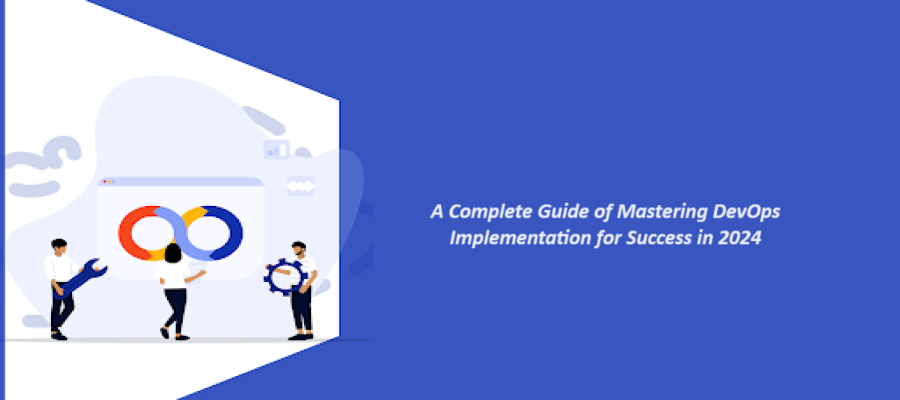In fast-paced digital landscape, DevOps is a game-changer for business organizations looking to streamline their software development with timely delivery. It is important to bridge the gap between development and operations teams. DevOps supports faster time-to-market, enhanced collaboration, and improved efficiency in delivering high-quality software applications. In this blog, we’ll discuss how DevOps can be implemented, exploring key principles, best practices, and strategies for success.
Introduction to DevOps
DevOps is a set of practices or tools focused on collaboration, automation, and continuous improvement. It is designed to break down communication limitation between the development and operations teams, enabling flawless integration and software delivery. By focusing on the culture of shared responsibility and accountability, organizations can enjoy greater agility and innovation in their software application development.
Planning Your DevOps Implementation
Before investing in DevOps implementation services, it’s important to assess how your organization is ready and define clear goals for successful implementation. Building a roadmap and identifying key stakeholders is important in ensuring a smooth transition to DevOps. In addition, effective communication and change management process are essential for garnering support and assign teams across the organization.
Building a DevOps Culture
Creating a DevOps culture begins with collaboration, trust, and transparency among the team members. Focusing on continuous learning and improvement is highly significant to overcome resistance to change and encouraging adoption of DevOps practices. By having a culture of experimentation and considering failure as an opportunity for growth, your business can setup an environment for innovation and success.
Tools and Technologies
A wide range of tools and technologies are present to support DevOps practices, ranging from version control systems and CI/CD pipelines to configuration management tools and monitoring solutions. Making the right tools for your business organization’s needs and integrating them within the development workflow is important for maximizing efficiency and productivity. Whether you’re automating build and deployment processes and reliability, leveraging the right tools can streamline your DevOps journey.
Implementing Continuous Integration (CI)
Continuous Integration (CI) is the foundation of DevOps that includes automating the process of integrating code within the shared repository and running automated tests to guarantee code quality. By having automated build and test pipelines, organizations can identify and address issues initially in the development cycle, eliminating the risk of integration failures and speeding up the delivery of latest features and updates. Moreover, when you hire DevOps developer, you get timely and professional services for your business software development and delivery.
Implementing Continuous Delivery (CD)
Continuous Delivery (CD) extends the CI principles by doing automation of deployment and release processes. It enables organizations to deliver software changes to the production quickly, safely, and reliably. By automating deployment pipelines and implementing techniques including blue-green deployments and canary releases, business groups can lower downtime and accelerate time-to-market while maintaining high standards of quality and reliability.
Monitoring and Feedback Loop
Monitoring is a critical aspects of DevOps, supporting organizations to gain insights into the performance and reliability of their systems and applications. By placing monitoring and alerting systems and analyzing metrics, organizations can detect and diagnose issues proactively. This minimize downtime and optimize overall performance. Incorporating feedback loops within the development process supports continuous improvement, empowering teams to iterate and refine their practices depending on real-world data and user feedback.
Security and Compliance
Security is always on priority with DevOps services. Organizations are focused on integrating security practices within every stage of the development process. By applying security scanning and vulnerability checking process, you can identify and remediate security challenges early in the development process. This reduce the risk of security breaches and compliance violations. Ensuring compliance with industry standards and regulations is important to secure sensitive data and maintain trust with customers and stakeholders.
Measuring Success
Having proper measuring parameters of your DevOps implementation is important to track progress, identifying areas for improvement, and demonstrating the DevOps value to stakeholders. Key performance indicators (KPIs) including deployment frequency, lead time, mean time to recovery (MTTR), and customer satisfaction. These metrics assess the effectiveness of the DevOps initiatives. By tracking and analyzing such metrics over time, organizations can receive insights about performance and drive continuous improvement.
Wrapping Up
In conclusion, DevOps implementation requires careful planning, commitment, and dedication. By consulting DevOps development company for principles and best practices, organizations can enjoy higher agility, innovation, and efficiency within the software development. Whether you’re looking to streamline the CI/CD pipelines, enhance team collaboration, the security and reliability of your systems, DevOps offers multiple opportunities for transformation and growth. With the right mindset, tools, and strategies employed, you can master DevOps implementation and unlock the full potential of the organization.












